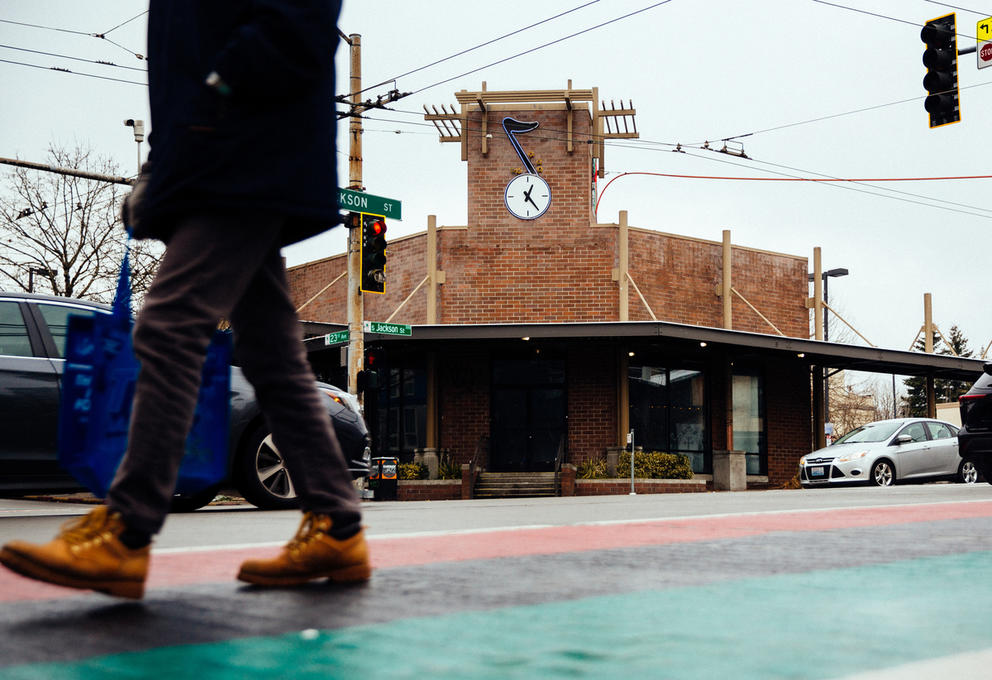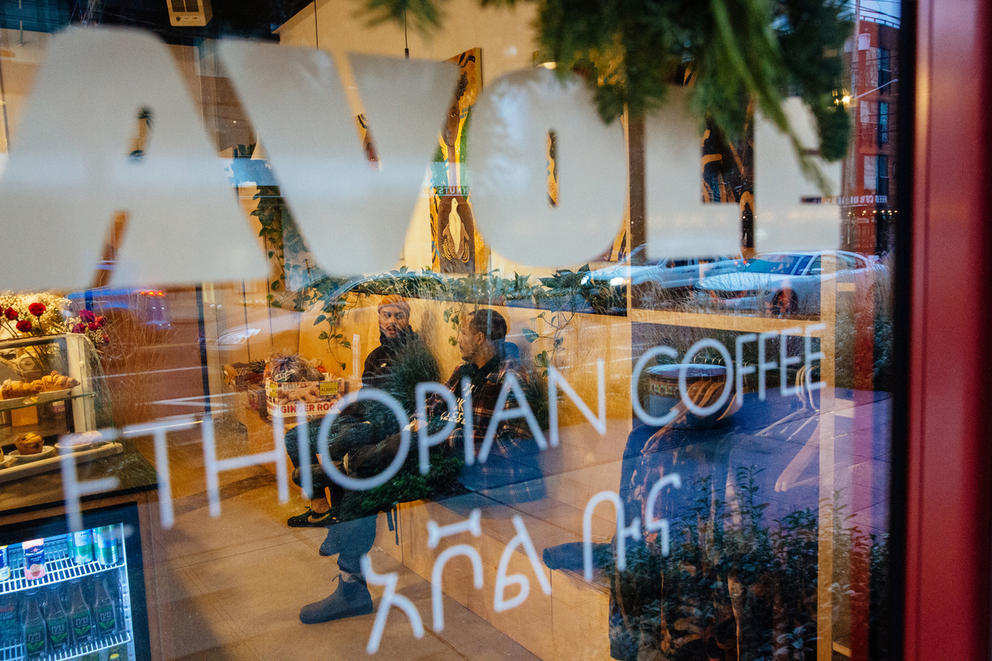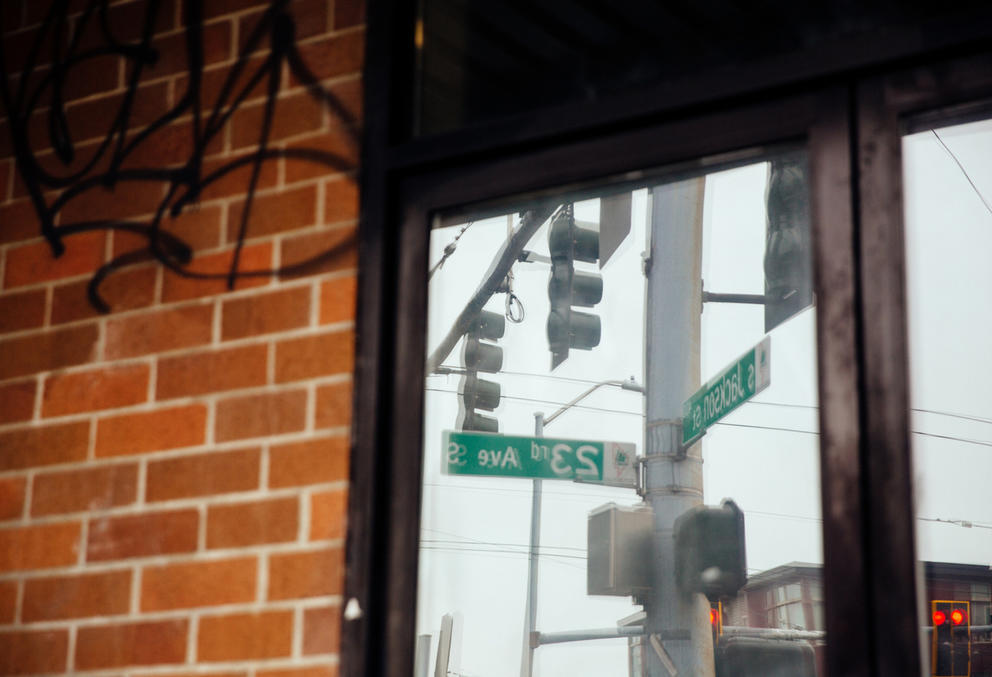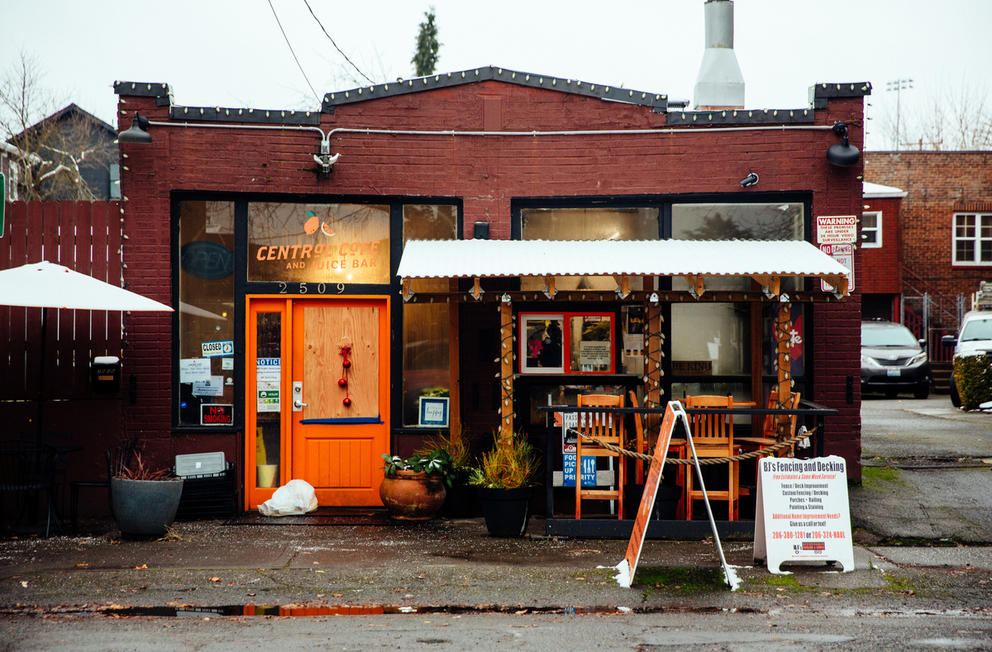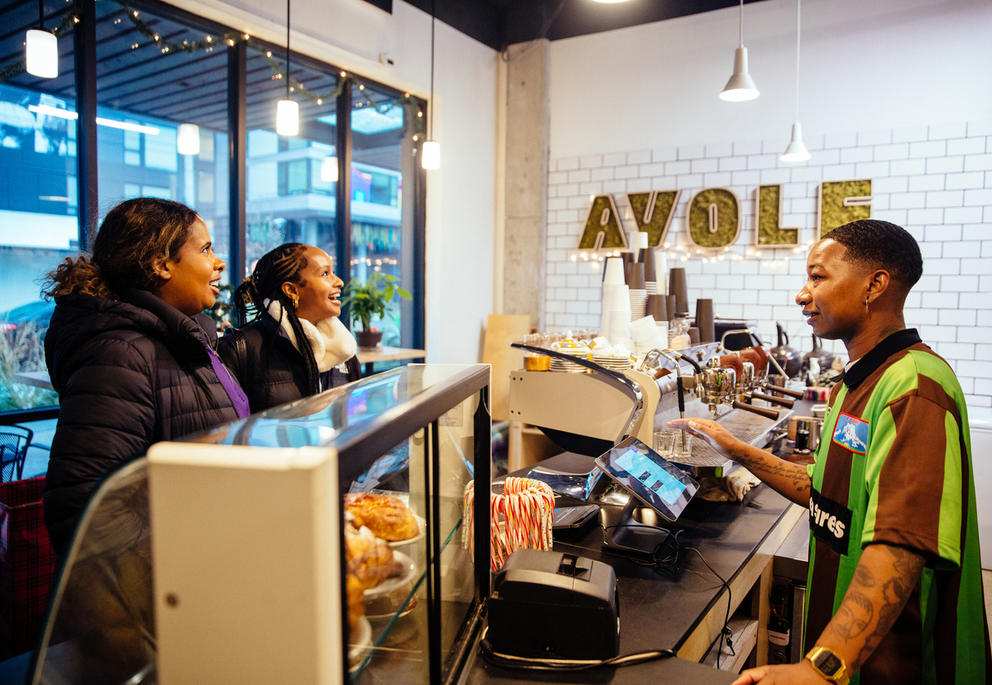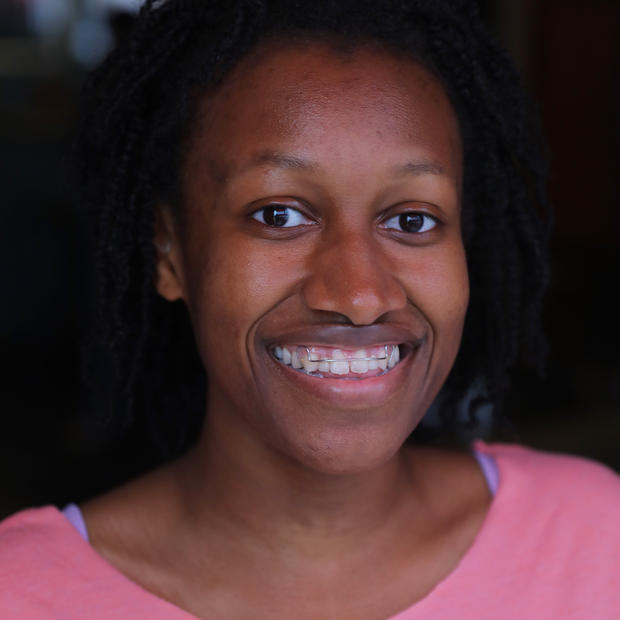Back then, Starbucks had more than 600 stores across the country and was one year away from expanding into Japan, yet had not ventured into Seattle’s Central District. Staggers wanted to see a big-name coffee shop at the Jackson Street location and went through nearly two years of negotiations to get Starbucks into the space.
At one point during those negotiations, Staggers recalls, a Starbucks representative told him that “Black people don’t drink that much coffee.”
When Bridgette Johnson, current owner of Central Cafe and Juice Bar — one of three Black-owned coffee shops now in the neighborhood — hears that story, her response is dismissive. “Get out of here,” she says. “Everyone drinks coffee.” We are in Seattle after all, she adds.
A Starbucks did eventually open at 23rd and Jackson, in 1997. But after 25 lively years, the shop closed July 31, shuttered along with four others in Seattle due to what the corporation says are concerns about crime. But, like so many things in the Central District, the gourmet coffee scene is changing. And some are hoping that a Black-owned coffee shop might soon be brewing in the once-thriving corner spot.
During its lifetime, the Starbucks at 23rd and Jackson was a treasured community gathering place.
“It was us,” says Michelle Merriweather, the president of Urban League of Metropolitan Seattle. For a few years around 2016, the Urban League hosted office hours there, working with people on job applications and other career development. She remembers it as a happy place, one of connection and refuge, always full of energy.
Above the entrance to the brick building is a clock in the shape of a musical note and an image of a man playing sax — a nod to Jackson Street’s history as the home of many legendary jazz clubs from the 1930s to the 1960s.
Darnesha Weary, co-owner of Black Coffee Northwest in Shoreline, remembers the days in the early 2000s when her sorority, the graduate chapter of the University of Washington’s Zeta Phi Beta, “adopted” the street in front of the store and did clean-ups as a public service. She remembers its positive, chill vibe and people calling it the “Black Starbucks.”
Coffee entrepreneur Gavin Amos worked at various Starbucks cafes in Seattle — including at 23rd and Jackson — before branching out on his own. He remembers that six years ago “coffee culture was not welcoming to me.” In fact, working at the Jackson Street store was “the only time I worked at Starbucks and everyone else was Black.”
Staggers originally sought a Starbucks for the Central District in an attempt to demonstrate the neighborhood’s desirability to other businesses. Back then, he says, it was difficult to get a cab or pizza delivery, much less attract any type of new business.
The success of the Jackson Street Starbucks also proved that a coffee-consuming public lived in the Central District. Soon after, Staggers remembers, corner stores started selling fresh coffee, and the Black-owned Promenade Red Apple franchise across the street — which closed in September 2017 as part of Vulcan real estate’s redevelopment plan — put a coffee cart outside.
Since that first neighborhood Starbucks opened, the Black population in the Central District has declined from about 36% in 2000 to below 10% in 2022, while the number of cafes and juice bars serving coffee (Black-owned or otherwise) continues to grow.
Weary, of Black Coffee Northwest, has been eyeing the empty 23rd and Jackson space since she heard about Starbucks’ closing. She says she has already been in conversation with Vulcan (which owns the property) about opening a shop in the space. “We are very, very, very hopeful,” Weary says. And as much as the former Starbucks was a community space, she says, “I think we can do better.”
While Weary is eager to move Black Coffee Northwest in, she says it doesn’t necessarily have to be her business taking over the empty Starbucks. “We would be happy if another Black shop or store took the space,” she says. Overall, she hopes another big corporation doesn’t move in.
As for the current status of the building: A Vulcan representative wrote in an email, “Starbucks is the current lease holder. However, Vulcan is actively looking for a new tenant, and Starbucks is supporting those efforts.”
Weary says that since opening Black Coffee Northwest in Shoreline in 2020, her business has been about “more than just coffee.” In a city with a proportionally smaller Black population than the Central District (5.98% in 2020), she emphasizes a bigger mission: working toward economic justice, facilitating hard conversations and giving Black people a safe place to be.
Even the coffee cups at Black Coffee take a stand, carrying messages like “Black lives matter” and “How are you showing up today?” On weekdays the business closes at 3 p.m. to host after-school programs for neighborhood youth. A colorful space behind the shop holds audio recording equipment and musical instruments. Weary says coffee is also a career opportunity.
“Coffee is a lucrative industry,” she says. “Brown people need to be all up in there” as baristas — a good entry-level job with transferable skills that can be done anywhere — and all the way up the chain, she says.
But Weary does not want her Black-owned shop to be a party to the exploitation of other Black people, including those involved in harvesting the coffee beans. She says she learned a lot about sourcing and sustainability from her mentor Efrem Fesaha.
Fesaha owns Boon Boona, an exclusively African-sourced roaster and cafe that opened in Renton in 2018 (though he has been sourcing African coffee since 2012). The business — which opened a second location near Seattle University in 2021 — also hosts East African coffee ceremonies.
Asked if there is room for another Black-owned coffee shop in the neighborhood, Fesaha responds, “Heck yeah!”
Fesaha’s family moved to Seattle from Eritrea when he was 5 years old. Though he grew up in West Seattle, he frequented the Central District for its wealth of Eritrean cultural spaces. Many of those spaces are gone, but still, “That’s our neighborhood,” he says.
Fesaha emphasizes that coffee culture isn’t a recent European creation. It began in Ethiopia more than 1,000 years ago. The story goes that a goatherder’s goats got into some cherries, and when he noticed the animals dancing around, he brought the cherries back to his village. Those cherries turned out to contain coffee beans, and the rest is caffeine history.
One of Feseha’s aims in starting Boon Boona was to spread knowledge of and appreciation for the history of coffee, along with more connection to the African continent. “Sourcing is very important to us,” he says. Boon Boona coffee comes exclusively from Ethiopia, Rwanda, Burundi, Kenya and parts of West Africa. Africa produces roughly 13% of the world’s supply of coffee. (While Latin America produces a greater percentage of the world’s coffee – Brazil alone produces more than a third – coffee production didn’t begin there until Dutch traders introduced the plants in the 1700s.)
In 2011, when Fesaha first approached a bank in search of funding for Boon Boona cafe, the financiers wanted to know if he would perform like Starbucks. Becoming another Starbucks was not his goal, and he did not get that funding.
Now Fasaha is doing a buildout on a third Boon Boona cafe, inside the University of Washington bookstore. And he still aims to facilitate better representation of Black and brown people at all levels of coffee.
Weary connected with Fesaha through Instagram, and used Boon Boona coffee beans at Black Coffee Northwest for the first year. Efrem then coached the store into developing its own blend, roasted through Fulcrum Coffee in downtown Seattle. (Black Coffee Northwest wants to do its own roasting soon.)
That collaboration has inspired in Weary a desire to pay it forward. She keeps an all-Black Rolodex of employees and partners to build the Black coffee community. Most of the Black establishment owners interviewed noted that it hasn’t been easy to start their own coffeehouses. Weary recalls that “people were looking at us sideways” when she and her husband first entered the coffee scene, even though, she says, “We know coffee.”
“There’s too few of us,” Fesaha says. He believes Black coffee shops should come together and support one another. “We use space to really engage our community,” he adds, noting that the cafes have hosted Urban League boosters and nonprofit fundraisers as well as live music, poetry readings and author readings.
Also deeply invested in the community is Bridgette Johnson, of Central Cafe and Juice Bar on East Cherry Street. She opened four years ago and now sells coffee, juices, breakfast and lunch. Johnson says some people come in assuming she doesn’t understand gourmet coffee, but that her coffee (she too uses a custom blend from Fulcrum) speaks for itself. To survive COVID, she found new ways to utilize outdoor spaces — opening a covered side patio (no longer available) and a walk-up to-go window. Now she has a second location in the works, in the Seattle Municipal Building downtown.
Johnson says having good coffee has earned her awesome regulars. But more important, she says, creating a safe space for young people to hang out allows her to talk to them about what’s going on in the community and the world. For example, after postal shop owner D’Vonne Pickett Jr. was murdered just a few blocks away, she began encouraging the youth to vote if they want to stop the gun violence around them.
Both she and Weary note that as independent business owners, they can serve advice, encouragement and challenges to the status quo alongside drinks — without needing to seek permission from corporate higher-ups.
To Johnson, the closure of the Starbucks at 23rd and Jackson brings new opportunities for small businesses. Those former customers are business to be had, she says.
One of the most recent entries in the Central District’s Black-owned coffee biz is Avole, at 23rd Avenue South and South Union Street. Located in the historic Liberty Bank development — between the Black-owned Communion restaurant and Earl’s Cuts — the tiny, cozy spot sells coffee, juice and snacks. Gavin Amos, along with Solomon Dubie and Getachew Enbiale, have been roasting Avole coffee beans for eight years, both for their original (now closed) shop in the South Seattle neighborhood of Brighton and for venues including the Africa Lounge at Sea Tac Airport.
While Avole’s relaxed vibe and tiny footprint is completely different from a Starbucks, Amos is no stranger to the company. Over the past decade, he worked at the Starbucks in Columbia Tower, in the Seattle Convention Center, and, for a few closing shifts, at 23rd and Jackson. At Starbucks he completed his coffee master training, where he learned about single-origin coffee and became aware that coffee’s origins are in Ethiopia.
“Coffee has always been a Black and brown commodity,” he says, noting that it continues to be grown mostly “garden style” in Ethiopia. His fascination with Ethiopia’s coffee culture, history and taste led him to partner with Dubie — who is Ethiopian and has been roasting coffee since he was 8 years old — and start roasting Avole coffee.
While the neighborhood waits to see what will happen in the 23rd and Jackson spot, the original proponent of a coffee shop on that corner remains hopeful. Staggers says that putting a Black-owned coffee shop there “would be a good idea.” Noting that it would face the same safety challenges that Starbucks referenced in its closure announcement, he contends that the block retains many advantages. It’s “on the right side of the street,” he says, to catch people going downtown or to school. Also, it’s near bus routes and has plenty of parking.
Even with the new crop of coffee retailers in the neighborhood, including the three Black-owned shops noted here, Staggers believes — 25 years later — there is “still an opportunity to grow” for small business owners in the Central District coffee scene.
Get more Black Arts Legacies
This newsletter features a new artist each week, along with additional stories, exclusive content and responses to reader questions.

